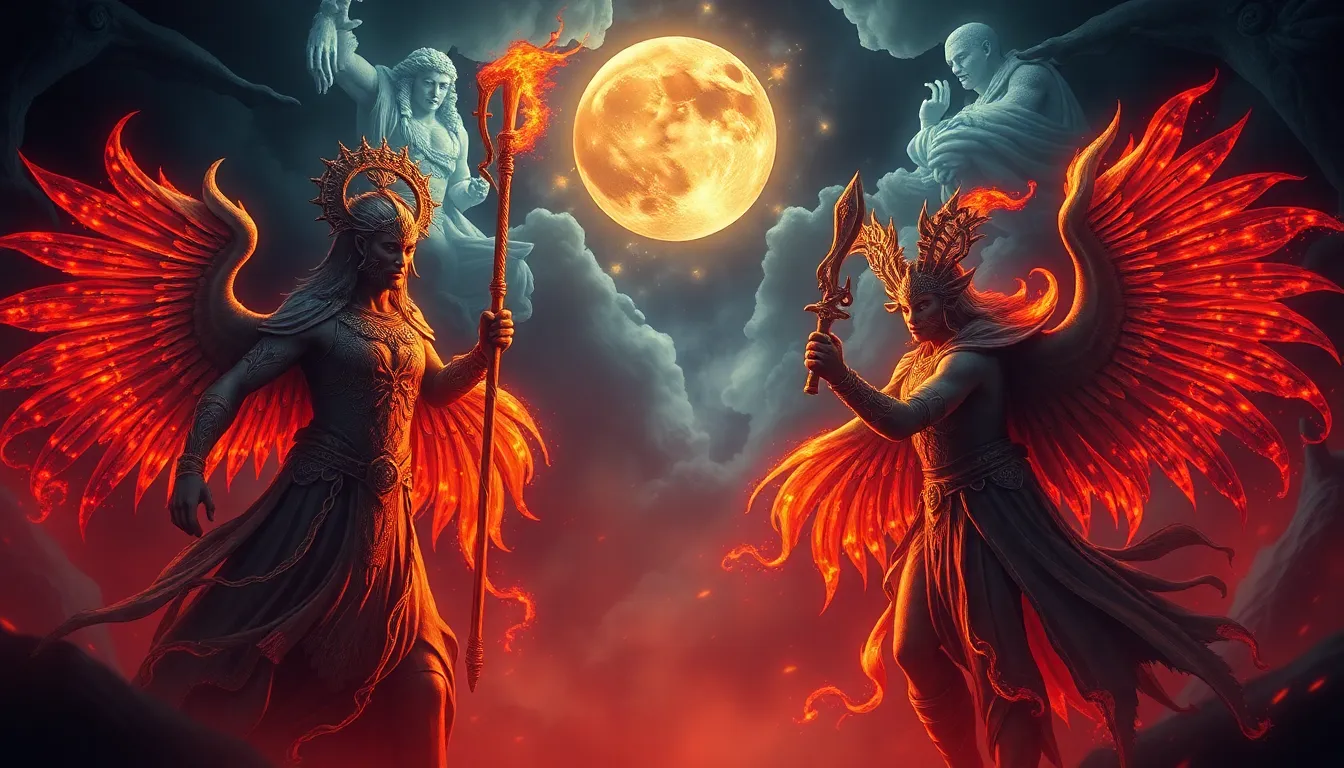Unveiling the Secrets: How the World Was Born in Different Cultures
Introduction
Creation myths are powerful narratives that offer insight into how different cultures understand the origins of the world and humanity. These stories serve not only as explanations for the existence of life but also as frameworks for cultural identity, morality, and societal structure. Through these myths, we explore the complex tapestry of human thought and belief, revealing the significant role of storytelling in shaping our understanding of human existence.
The Concept of Creation: A Universal Theme
Creation myths can be defined as traditional stories that explain the origins of the universe, humanity, and life itself. They often address fundamental questions about existence and are deeply embedded in the cultural fabric of societies. Common elements found in these stories include:
- The presence of a creator or deities
- The existence of chaos or primordial elements
- The process of creation, often involving the separation of earth and sky
- The establishment of order from chaos
Creation Myths in Ancient Civilizations
Mesopotamia: The Enuma Elish and the Birth of the Gods
In ancient Mesopotamia, the Enuma Elish is one of the most significant creation myths. This epic poem describes how the god Marduk emerged victorious over the chaos represented by the goddess Tiamat. After defeating Tiamat, Marduk creates the world from her body, establishing order and creating humanity to serve the gods. This narrative highlights themes of conflict, power, and the divine right to rule.
Ancient Egypt: The Role of Atum and the Primordial Waters of Nun
In ancient Egyptian mythology, Atum is the creator god who emerges from the primordial waters of Nun. The creation story begins with Atum who, through self-creation, brings forth the first gods, Shu (air) and Tefnut (moisture). This myth emphasizes the importance of balance and harmony in the universe, with Atum representing the cyclical nature of creation and regeneration.
Eastern Perspectives on Creation
Hinduism: The Cosmic Cycle of Creation and Destruction in the Rigveda
Hindu creation myths are rich and varied, with the Rigveda presenting a profound exploration of the cosmic cycle. According to these texts, the universe undergoes endless cycles of creation (srishti), preservation (sthiti), and destruction (pralaya). The god Vishnu plays a crucial role in maintaining cosmic order, while Brahma is often credited with the act of creation itself. This cyclical concept reflects the beliefs in rebirth and the interplay of creation and destruction.
Buddhism: The Concept of Dependent Origination and the Universe’s Beginning
In Buddhism, the focus is less on a singular creation event and more on the concept of dependent origination (pratītyasamutpāda). This idea suggests that all phenomena arise in dependence upon multiple causes and conditions. The universe is seen as an interconnected web, with no definitive beginning or end, emphasizing impermanence and the transient nature of existence.
Indigenous and Tribal Narratives
Native American Creation Stories: Variations and Themes Among Different Tribes
Native American tribes have diverse creation stories, each reflecting their unique cultural experiences and values. Common themes include the emergence of the Earth from water, the creation of animals and plants, and the role of trickster figures. For example, the Iroquois creation story describes how Sky Woman fell from the sky and gave birth to the Earth, while the Lakota recount how the world was created from a giant turtle’s back.
Aboriginal Australian Myths: The Dreamtime and Ancestral Beings
In Aboriginal Australian cultures, the Dreamtime is a foundational concept that explains the origins of the world and the laws governing it. During the Dreamtime, ancestral beings traveled the land, creating landscapes, animals, and people. These stories emphasize a deep connection to the land and the importance of maintaining harmony with nature.
The Abrahamic Traditions
Judaism and Christianity: The Genesis Creation Narrative
The Genesis account in the Hebrew Bible presents a linear narrative of creation, where God creates the world in six days and rests on the seventh. This story introduces the concept of a singular, omnipotent creator and sets the foundation for Judeo-Christian beliefs about humanity’s role in the world. The creation of Adam and Eve highlights themes of free will, responsibility, and the relationship between humanity and the divine.
Islam: The Creation Story in the Quran and Its Interpretation
In Islam, the creation narrative found in the Quran emphasizes the power and wisdom of Allah as the sole creator. The Quran describes how Allah created the heavens and the earth in six days, with humanity being created from clay. This narrative reinforces the idea of divine authority and sets forth moral guidelines for human conduct and stewardship of the earth.
Creation Myths in East Asian Cultures
Chinese Mythology: The Pangu and the Creation of the Universe
Chinese mythology features the story of Pangu, a giant who is said to have created the universe. According to legend, Pangu emerged from a cosmic egg and separated the sky from the earth. After his death, his body transformed into various elements of the world, symbolizing the interconnectedness of life and nature.
Japanese Shinto: The Story of Izanagi and Izanami
In Shinto, the creation myth revolves around the deities Izanagi and Izanami, who are tasked with creating the Japanese islands. Their story involves themes of love, loss, and the cycle of life and death, reflecting the spiritual connection between the land and its people.
Modern Interpretations and Scientific Perspectives
The intersection of creation myths and modern scientific theories, such as the Big Bang, raises intriguing questions about the nature of existence. While scientific explanations provide empirical insights into the origins of the universe, creation myths continue to offer profound philosophical and spiritual interpretations. These narratives influence contemporary beliefs and invite us to explore the meaning of our existence in both a scientific and a mythological context.
The Cultural Significance of Creation Myths
Creation myths play a crucial role in shaping societal values, religious beliefs, and cultural identities. They offer lessons about humanity’s relationship with the universe, morality, and the significance of community. By examining diverse creation narratives, we gain insights into the shared human experience and the ways in which different cultures interpret their origins.
Conclusion
Understanding creation myths from various cultures is essential for appreciating the rich tapestry of human storytelling and belief systems. These narratives not only reveal how different societies view their origins but also reflect universal themes that resonate across time and space. By exploring these creation stories, we deepen our understanding of ourselves and the world around us.



